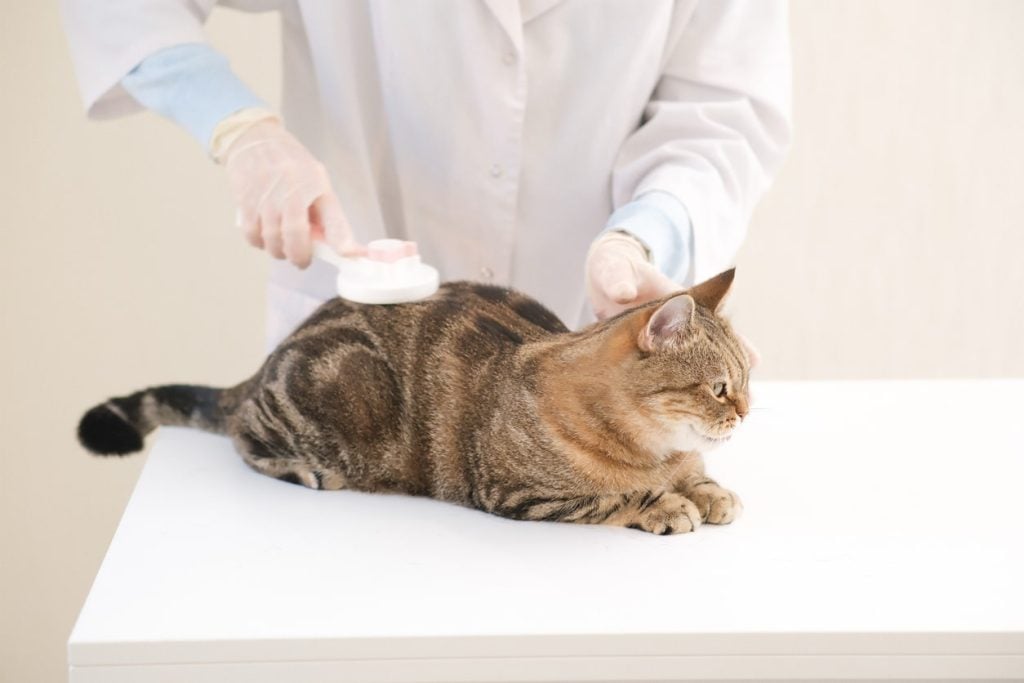All cats can catch fleas. While fleas may be tiny, they can cause big health problems like itchy skin, restlessness, and redness. Plus, a serious case of fleas can lead to significant blood loss. Since fleas can wreak havoc on your cat, early treatment is critical. The most common flea treatments and prevention methods are topical treatments/medications, flea collars, and flea-specific products.
Read on to learn about the different flea prevention and treatments available, with detailed information about their usage and efficacy.
The 5 Best Flea Prevention Products for Cats
Many products can help protect your feline from fleas. Always make sure the one you choose is safe for cats. “Flea treatments meant for dogs often contain chemicals like permethrin, which are highly toxic to cats,” states Dr Caroline Gardner, a vet at Oak Vet Group.
Below are the most common ways you can prevent your cat from getting fleas.
1. Flea collars
How they work: a flea collar typically starts working one to two days after your cat starts wearing it. “[They] slowly release medication that covers your pet’s coat to protect them against fleas and ticks,” explains Dr Carly Fox, senior veterinarian at Schwarzman Animal Medical Center in the USA.
Benefits: Dr Fox says that Seresto, a popular and effective cat flea collar, offers several key advantages.
- Pests are stopped at contact, not after biting
- Effective against fleas in different stages of the life cycle
- It works for eight months
- Cost-effective
- Can be used alongside other treatments in high-risk cats
Risks/considerations: Dr Fox says flea collars are generally safe for cats. The most common side effect includes fur irritation or itching. In rare instances, severe reactions such as seizures and incoordination may occur. Ingestion of the collar can also lead to serious side effects.
2. Topical treatments
How they work: topical treatments are applied directly to the skin. Dr Fox says your cat’s skin absorbs the medication and circulates it through the bloodstream to paralyse fleas after they bite. Some topical treatments can be purchased over the counter, while others are prescribed by vets.
Benefits:
- Easy to use and apply
- Good alternative to oral medications
- Effects last up to one month
- Offer up to 90% protection against fleas and ticks
- Many also protect against other parasitic infections, such as ringworm
- Can be used to treat existing flea infestations on a cat
Risks/considerations: Dr Fox says side effects can include hair loss and sensitivity at the application site. “Rarely, it can cause neurologic side effects in pets, especially if applied to the wrong species (i.e putting dog topical on a cat) or if your pet has an underlying seizure condition,” she adds.
Pet parents should also not bathe their cats three days before or after applying a topical flea treatment.
3. Oral medications
How they work: after being ingested, the medication is absorbed into the bloodstream. Dr Fox says the fleas are killed while biting your cat.
Benefits:
- Quick to work, usually within a few hours of ingestion
- Up to 99% effective
- Some oral medications work against additional parasites, including hookworms and mites
- Can be used to treat existing flea infestations on a cat
Risks/considerations: Dr Fox says some cats experience gastrointestinal sensitivity after taking oral flea medications. These drugs also come with a risk of neurological side effects.
4. Flea shampoo
How it works: Dr Fox says flea shampoo works by interfering with the flea’s nervous system or dehydrating it—ultimately leading to the flea’s death. However, flea shampoos are a treatment, not a preventative.
Benefits:
- Immediate relief; work within minutes of application
- Cost-effective
Risks/considerations: Dr Fox states that flea shampoos are not as effective as topical or oral medications, meaning all the parasites will likely not be killed. Your cat may also experience sensitivity or an allergic reaction to the shampoo.
5. Flea combs
How they work: “A flea comb works by trapping fleas, eggs, and dirt between the teeth,” shares Dr Fox. While these combs can help you spot fleas, they’re not very effective in treating or preventing the parasites.
Benefits:
- Inexpensive
- Safe for use in younger kittens who cannot receive oral or topical medications
- Easy to use
Risks/considerations: “You will undoubtedly miss adults and eggs in your pet’s coat,” notes Dr Fox. And, even though the tool is easy to use, thoroughly combing your cat’s entire coat is a time-consuming process.

iStock/Dinara Ilikaeva
Can You Prevent Fleas in Cats At Home?
If you don’t want to use medications, natural solutions can help prevent flea infections. “Maintaining cellular energy, vitality, and balance in cats will help minimise fleas,” states Dr Jeff Feinman, a veterinarian and educator. Feed your cat a fresh diet and keep them entertained with toys and exercise.
Other beneficial approaches can include:
Essential oils
Some essential oils contain properties that can repel fleas:
- cedarwood
- lavender
- lemongrass
- eucalyptus
- peppermint
Essential oils should be properly diluted, and they should never be applied directly to a cat’s skin.
Always monitor for any adverse reactions, such as skin irritation. And, when possible, speak with your vet before using essential oils.
Herbal flea collars and sprays
Dr Feinman says herbal flea collars and sprays are sometimes effective. Store-bought herbal collars typically contain essential oils to repel fleas. While making collars and sprays at home is possible, doing so is complicated and not 100% safe.
If you want a quick fix, opt for a spray. “Sprays offer more immediate but shorter-term protection,” Dr Feinman says. Meanwhile, collars provide continuous protection.
Regular grooming
Regular grooming is crucial for flea prevention. Dr Feinman says it helps balance a cat’s environment and keep their skin healthy.
Additionally, he explains that regular grooming allows pet parents to detect fleas early and comb out eggs. It also helps maintain good skin and coat health, which is key to fighting fleas.
How to Choose the Right Flea Preventative For Your Cat
All cats are different, so it’s essential to select the best prevention for your cat. Get your vet’s advice before starting any methods.
Dr Feinman says vets will choose your cat’s flea preventative based on:
- Age. Some flea preventatives are not suitable for very young kittens or senior cats.
- Indoor vs. outdoor. Outdoor cats may require stronger, more frequent treatments.
- Health. Consider any existing health conditions or medications.
- Safety. Choose products specifically designed for cats.
How to Prevent Cat Fleas in the First Place
There’s one very important approach to prevent fleas from setting up home in your house: maintain a regular and thorough cleaning routine. Dr Gardner advises pet parents to:
- regularly vacuum floors, furniture, and skirting boards
- wash all bedding, including your pet’s, in hot water
- consider steam cleaning
- dispose of the vacuum bag or empty outside to avoid re-infestation
- use a household flea spray
While you can’t control where an outdoor cat roams, you can take steps to minimise the presence of fleas in your garden. Keep your lawn well trimmed and raked, and consider using pet-friendly natural sprays to deter fleas.
Lastly, Dr Gardner says prevention measures are particularly important in shaded areas, where cats like to rest.
Cat Flea Treatment & Prevention FAQs
We’ve covered the main points of flea prevention, but here are some answers to other commonly asked questions.
What should people know about natural flea medication?
It’s tempting to opt for products that contain ingredients we recognise. However, Dr Gardener says while these treatments are appealing, they often don’t have extensive testing.
What is the difference between prescription and OTC flea medications?
Dr Fox reveals that over-the-counter (OTC) and prescription medications are regulated differently. She explains that OTC medicines are less effective and pose a higher risk of negative side effects.
Should I get Frontline or Advantage?
Frontline and Advantage are two popular topical cat flea treatments. Whichever solution you choose, Dr Feinman says you should apply it where your cat can’t lick it off. Also, watch for any bad reactions and check for potential interactions if your cat takes other medications.
| Frontline | Advantage | |
| Active ingredient | Fipronil (targets adult fleas and ticks) | Imidacloprid (targets adult fleas and larvae) |
| Application | Applied once a month | Applied once a month |
| Effectiveness | Starts to work within 24-48 hours | Starts to work within 12 hours |
| Considerations | Generally safe, watch for any adverse reactions | Primarily for fleas, not other parasites (including ticks) |
Why should I choose a medication that can combat multiple pests?
A combination product can be highly beneficial for tackling several parasites at once. Dr Fox says only giving one medication is better for the pet and also helps pet parents stick to a schedule.
Check with your vet before giving your cat a combination product since some require additional testing.
Do indoor cats need flea medication?
Yes! “Even if your cat stays indoors, taking flea preventative measures is essential,” Dr Gardner says. Other people, pets, and even second-hand furniture can carry fleas into your home.
When should I avoid flea medication?
In certain instances, pet parents should avoid giving their cat flea medication or a different amount than recommended on the packaging.
“Kittens, elderly cats, or those with underlying health conditions may require special considerations,” Dr Gardener explains. Your vet can always recommend the best treatment for your cat.



